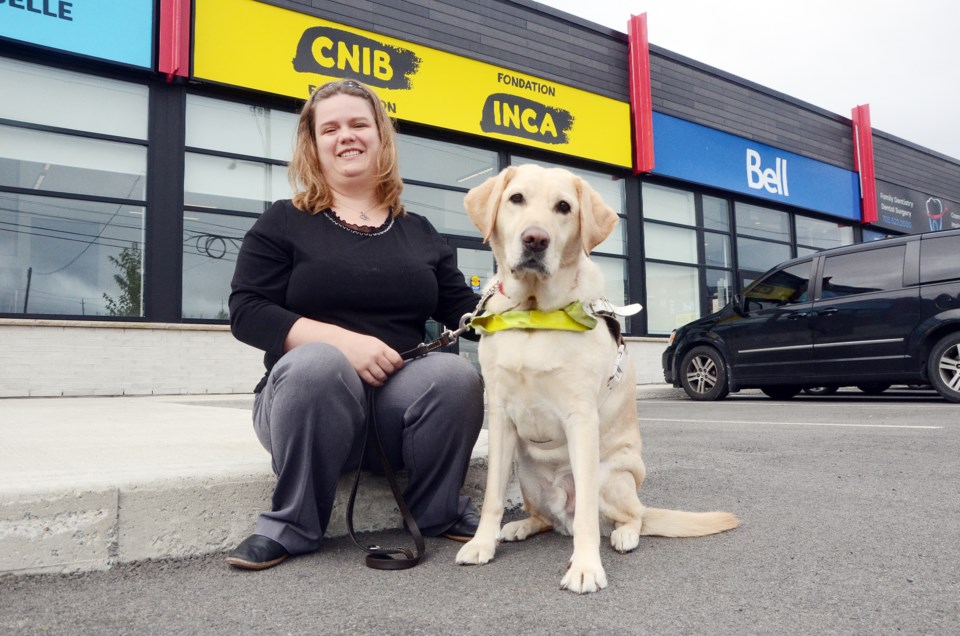Despite clear laws allowing service animals into public places, guide dog handlers continue to face discrimination when entering businesses, restaurants and stores.
Stephanie Pilon can attest to that. She's the program lead for children and youth engagement at the Sudbury office of the Canadian National Institute for the Blind. She's blind, and her guide dog's name is Luca. They've been working together for three years.
“I hear lots of stories, but for me in Sudbury, it hasn't happened all that frequently, but it has happened,” Pilon said.
One of the more frequent services that deny access to individuals with guide dogs are taxis and ride-sharing programs like Uber, Pilon said.
“Every time I call a cab, I have anxiety, because I wonder if I'm going to be denied service this time,” she said. “And now, with the rising popularity of ride-sharing services, people are being denied even more because there's no education on the driver's part.”
The law is clear, though. In all of Canada's 10 provinces and three territories, legislation prohibits discriminating against a person with a disability who is working with a guide dog. Discrimination includes denial of access to any premises to which the public would normally have access.
Legislation varies from province to province, however in all provinces it contravenes the Charter of Human Rights and Freedoms to deny a blind person accompanied by a guide dog access to a federally owned or regulated place or service.
“It's very frustrating,” Pilon said. “By law, I don't have to inform a cab company that I'm blind and have a guide dog, but it's something I choose to do.”
On the other end, Pilon fully understands people do have allergies to dogs or other issues, but there is a way to handle it correctly.
Businesses do have rights, as well, Pilon said, but it has more to do with dogs that might be misbehaving, like jumping up on tables, or barking. The business can ask that the dog be removed, but they cannot deny initial access.
If refused service or denied access, guide dog handlers in Ontario should call the police. Under Ontario’s Blind Persons’ Rights Act, no one can deny accommodations, services or facilities offered to the public “for the reason that he or she is a blind person accompanied by a guide dog.” If convicted, the person may be fined up to $5,000.
That's why the CNIB has declared September as Guide Dog Awareness Month. It's a time to raise awareness about the rights of guide dog teams and the legal responsibilities of businesses in Canada.
“We want to take the opportunity to let the public know what dog guides do,” Pilon said. “There are misconceptions, too, that guide dogs are cute and just follow their people around, but they do so much more than that.”
Pilon said it's a great time to stress the importance of guide dog etiquette, so that when people see dog guide teams, they know how to act accordingly.
“Guide dogs do serious work; they're not pets,” she said.
When a dog is in harness, most people do know they shouldn't pet the dog, but what people don't always know is they shouldn't distract that dog in any way. Don't talk to the dog, don't offer it food, and don't let your dog approach a dog guide in harness.
“I get asked probably 75 times a day if people can pet Luca,” Pilon said. “People shouldn't get offended when we say no. Sometimes I don't have time to stop and educate, and I think some people forget we are just trying to live our lives, even though we have cute dogs with us.”
Following four simple rules will ensure appropriate social behaviour in the dogs and reduce the risk of dangerous situations for the guide dog pair.
Harness on means hands off. A guide dog in harness means "Please don't distract me, I'm working."
Don't feed them. Especially when guide dogs are working in harness. Offering food can result in antisocial behaviour such as begging and scavenging off the ground.
Contain your excitement. Don't encourage excitable play. Guide dogs are given access to public places where other dogs are not permitted, so they must stay calm.
Say "hello" another time. If you're walking your pet dog and you approach a guide dog pair, take your dog away from the guide dog.
